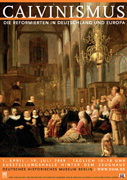


Exhibiton
| I. Calvin and Geneva
| II. The Confession
| III. The Reformed Alliances
IV. Discipline and Republic
| V. Iconoclasm and New Pictorial Worlds
VI. The Word of God
| VII. The New Order of Life
| VIII. Traditions
Geneva became the centre of John Calvin’s activities as Protestant reformer after having to leave his native country of France in 1535 in the wake of religious turmoil. That year the Greater Council of Geneva had voted in the Reformation and rid itself of the rule of the bishop and the Duke of Savoy. The newly founded Republic of Geneva managed to assert its sovereignty through an alliance with the Swiss Confederation.
The first attempt by Calvin and Guillaume Farel to establish the Reformation failed in 1538. Calvin therefore hesitated before accepting the request of the Genevan Council in 1541 to return to the city. But in the following years he succeeded in thoroughly reorganizing the Church in Geneva and introducing the four offices of pastors, teachers, elders and deacons. At the same time Calvin pressed ahead with a reformation in the lives of the believers. His ministry during a number of decades turned the city into the centre of Reformed Protestantism. The Geneva Academy, founded in 1559, became a gathering place and starting point for Reformed theologians from throughout Europe.
The relationship between Calvin and the city of his exile was never without friction. It was above all the strict church discipline that met with resistance on the part of Genevans. Many were afraid of losing their rights and liberties. Long-time residents saw the reformer as a foreigner who had taken over the helm and whose following continued to grow. As thousands of Huguenot refugees flooded into the city from France, the population doubled within a few years, which led to massive social conflicts. At the same time the new inhabitants bolstered the economic life of the city, especially in the areas of printing and clockmaking. It wasn’t until around 1555 that the political, social and theological conflicts had been settled to such a degree that the Reformation could be seen as having consolidated its position in Geneva.
